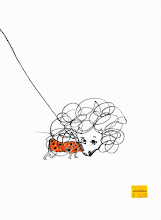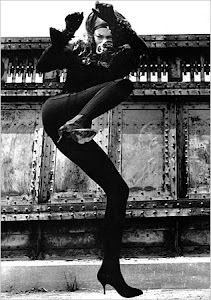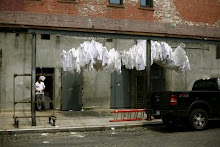The lineup to see Gore Vidal talk to Adam Gopnik on a theatre stage (which doesn't at first have the most exciting ring to it) was a full sidewalk wide and four blocks long, a wonderful thing to witness for an author and not a rock star or Paris Hilton. How encouraging! Upon closer inspection the crowd was definitely of a certain age, perhaps not a full head of hair or set of teeth in the lot. Ah well, you take your fans where you can get them.
Vidal is vital but very elderly, an "old" 81 if you see what I mean, wheelchair bound and a bit shaky in everything but the mind. Sadly the combination of his old man's voice, a poor microphone and acoustics and my own aging ears meant that I could barely make out what he was saying, though I was perhaps alone in this -- the rest of the crowd laughed uproariously at various junctures and I laughed along too, so as not to seem as though I didn't get the joke. You don't want to appear stupid anywhere near Vidal.
One thing I did hear was the answer to Gopnik's question about what writers Vidal admires these days. The short answer I think is "none". Why? "Writers today seem to want to TELL IT LIKE IT IS!" lamented Vidal, who cried there is no more flight of fancy or work of imagination. Hence an interest in children's books.
"Telling it like it is" is certainly a trend, and now people aren't even hiding the fact the story is autobiographical. The first such book I recognized was Stone Diaries by Carol Shields, which I found remarkable because it was about very ordinary people doing ordinary things, to whom nothing happened. And yet it was a good read. It takes a fine writer to pull that off.
However, I think Vidal is wrong. Some of the most entertaining books lately are those that are entirely made up and fanciful -- Harry Potter of course being a most obvious example. The Time Traveller's Wife is a story entirely of fantasy, and I'm not speaking merely of the time travel. This book encourages us to think there is such a thing as a destined soul mate, a recognizable twin in the world. It's a comforting if erroneous thought. Is this book a part of any pantheon, will it live through the ages? Probably not. But as a pleasant and leisurely Saturday afternoon read it sure beats Stone Diaries. Same goes for The Thirteenth Tale (delightful, and also poignantly about twin-ness, finding the "other" who completes you) or Special Topics in Calamity Physics. None of these have the intellectual heft to attract the likes of Vidal I'm sure. That said, these books provide a kind of nourishment sorely missing in a frantic and dire world. It is wonderful to get lost in a book again, any book that offers its larger truths in colourful, whimsical packages.
Subscribe to:
Post Comments (Atom)












1 comment:
I have long felt that Vidal is a first-rate essayist and a second-rate novelist. The only novel of his I could stomach was his most controversial: The City and The Pillar.
His sharp, cutting, polemical mind suits him ideally to the essay form.
It is preposterous for him to dismiss all contemporary writers as unworthy. This is a typical response of older generations who refuse to cede any ground to new aspirants. MacEwan, Banville, Munro, Amis, Harrsion, to name a few, are ample evidence that the literary scene today is bristling with fiction writers far superior to Vidal in his prime.
There is a wonderful quote from the French psychiatrist, philosopher and writer Jacques Lacan which speaks to the "twinness" you mentioned in The Thirteenth Tale: "Then who is this other to whom I am more attached than to myself, since, at the heart of my assent to my own identity it is still he who wags me?"
Lacan was an amazing thinker who developed a lot of interesting work in the realm of the other, which mirrored Jung's pioneering concepts of the animan and animus in us all.
Post a Comment